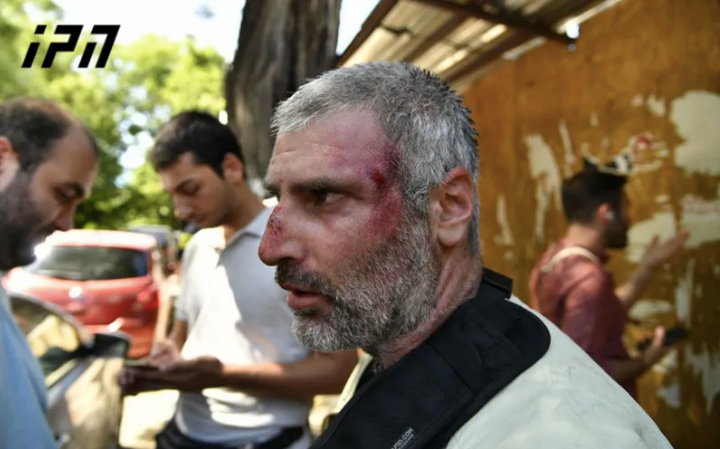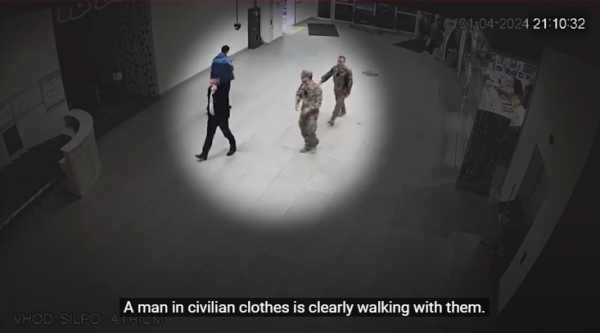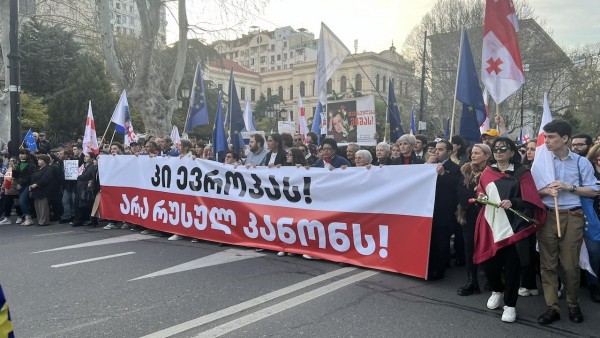The International Press Institute (IPI) today strongly condemned the mass violence against journalists reporting on anti-Pride protests in the Georgian capital Tbilisi and urged authorities to ensure that all those responsible are quickly identified and prosecuted.
At least 42 members of the media including journalists and camera operators were injured amidst widespread violence by anti-LGTBQ groups attempting to disrupt events for Tbilisi Pride, according to media reports and video footage.
Eight media workers have been hospitalized after journalists and TV crews were kicked and punched by far-right demonstrators in the city centre. Sticks and bottles were thrown and equipment belonging to TV stations was stolen or damaged.
Footage showed one protester attempting to drive a moped into a crowd of journalists gathered on the street, while photos reportedly showed a journalist being dragged through the streets in a headlock by an Orthodox priest.
Among those attacked were journalists from the Georgian public broadcaster, as well as commercial channels TV Pirveli, Tabula, Rustavi 2, Palitra News, Imedi TV, On.ge, TV Formula, InterPressNews and Mtavari Arkhi. All of those admitted to hospital are in a stable condition.
Ilia Tvaliashvili, a camera operator for the public broadcaster’s First Channel was hospitalized and an operator from Palitra News also required medical attention after suffering facial injuries.
Radio Free Europe/Radio Liberty journalist Tornike Mandaria reportedly suffered broken teeth after being assaulted and required treatment. Mako Jabua, a journalist for Tabula Magazine, was injured after being hit with a stick.
“The shocking scenes of violence against journalists covering anti-Pride protests in Tbilisi today are a horrific and direct attack on media freedom”, IPI Deputy Director Scott Griffen said. “Far from random attacks, members of the press were singled out and assaulted by protesters with fists, bottles and sticks. This is one of the most serious attacks on the press in Georgia in years and should be met with international condemnation.
“We urge government officials including the prime minister to immediately denounce these horrific attacks of the media and the LGTBQ community, which have so far shamefully been blamed on the Pride organisers themselves. Law enforcement authorities must provide a safe environment for the media to work in and ensure that all those responsible for today’s appalling attacks are quickly identified and brought to justice.”
🇬🇪 UPDATE: At least 40 media workers now reported to have been injured amidst widespread violence by far-right & anti-LGTBQ groups during anti-@TbilisiPride protests today, with eight hospitalised & one undergoing surgery. All those receiving treatment are in stable condition pic.twitter.com/6rkgOEc4As
— IPI – The Global Network for Press Freedom (@globalfreemedia) July 5, 2021
In response, the Interior Ministry said it had launched investigations into cases of interference with journalists‘ professional activities (Article 154, Criminal Code) and violence (Article 126). It is unclear if arrests had been made.
Reports suggested that when the violence erupted some journalists, including from the public broadcaster, were escorted out of the crowd by police. Other media workers reported that police did nothing while the protesters started attacking journalists.
Following the attacks, Georgian Ombudsperson Nino Lomjaria condemned the violence and said the violence posed “a real threat to the life and health of representatives of the media and hampers their journalistic activities”.
In a joint statement, the directors of Mtavari Channel, Formula and TV Pirveli placed responsibility for attacks on the government and Prime Minister Irakli Garibashvili, who they accused of declaring an “open hunting season for journalists and cameramen” through his comments attacking the Pride events.
During the day, far-right protesters also broke into and ransacked the office of Tbilisi Pride, tore down rainbow flags and threw an explosive device at the building, according to reports, while members of the LGTBQ community also faced threats and intimidation. A “March of Dignity” had been planned for later in the day on July 5 but was cancelled after the violence.
TV Formula journalist Rati Tsverava was attacked by anti-pride protesters near the Kashveti Church on Rustaveli Avenue. Tsverava was dragged away in a headlock by Georgian Orthodox priests. #TbilisiPride21
⚡️Live updates: https://t.co/7zEZax7riP pic.twitter.com/Xw0y03HZ4t
— OC Media (@OCMediaorg) July 5, 2021



